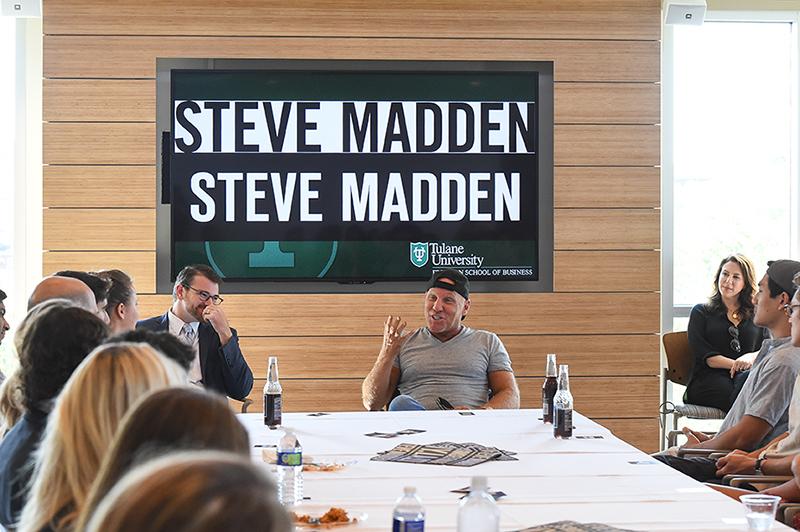For footwear giant Steve Madden, the shoe's the thing

Steve Madden built the footwear company that bears his name into one of fashion’s most iconic brands before being sentenced to three and a half years in jail for stock fraud.
Following his release in 2005, the humbled designer rejoined the business as creative director, where he’s helped take the company to even greater heights. He’s also recently taken on a more public profile. The 2013 film The Wolf of Wall Street depicts in part the events that led to his conviction, and a new documentary, Maddman: The Steve Madden Story, premiered last November and is now streaming on Netflix.
On April 25, Madden visited Tulane for “Self Made with Steve Madden,” a talk about his career moderated by Her Campus co-founder Windsor Western. Prior to the talk, however, Madden stopped at the A. B. Freeman School of Business for an intimate Q&A with business students hosted by the Albert Lepage Center for Entrepreneurship and Innovation.
Dressed in a T-shirt, jeans and a turned back baseball cap, the New York-born entrepreneur fielded questions on everything from how to start a business to the current state of retail to the secret of sustaining a brand.
“We have a great brand, but it’s because everybody, like me, lives and breathes the shoes.” Madden said. “All the other stuff — the social media, the Internet, bricks and mortar stores, Amazon — those are all platforms. It’s the product that’s important to me, and I’ve surrounded myself with people like that.”
A good example is Ed Rosenfeld, a former investment banker at Peter J. Solomon Co. who was named CEO of Steven Madden Ltd. in 2008. While Madden previously served as company CEO, he admits his personality was a poor match for the role.
“I’m the worst CEO in the world,” Madden said. “If I have a show and there’s cookies at the show and they don’t taste right, I’ll call up the restaurant and say, ‘Come down here. There’s something wrong with the cookies,’ in the midst of every buyer in the world. You can’t really run a big business being like that.”
Madden encouraged his audience of prospective entrepreneurs to seek out team members with knowledge and skills they lack.
“Early on, I was able to have a strong financial department,” Madden said. “I had no interest in that. I was like make the shoes, make the money and have somebody else sort it out for me. That was my philosophy. To this day, I don’t even read balance sheets.”
The notoriously free-associating entrepreneur also offered some surprises. When asked which business people he admired, Madden thought for a beat and then cited Bob Weir and the Grateful Dead.
“It’s a branding thing,” Madden said. “I’m not crazy about their music to be honest with you, but if you go to the [Dead & Company] concerts, you have people in their 70s, their 60s, their 50s, their 40s, their 30 and their 20s seeing them. I just think it’s the most amazing franchise. I’m blown away by them. I mean, the music’s alright.”
In the end, Madden said the company operates on a simple credo.
“We make shoes that people want to buy,” he said. “Still to this day, that’s sort of the company mantra.”
“Steve didn’t hold back when it came to discussing the work ethic it takes to turn $1,100 in your bank account into a $2.8 billion company or the self-awareness it takes to surround yourself with team members who have skills you don’t have,” said Lepage Center Executive Director Rob Lalka, who moderated the talk. “Our students really enjoyed the back-and-forth banter of the Q&A, and we were glad to give them the opportunity to learn from such a well-known entrepreneur in such an intimate setting.”
Interested in advancing your education and/or career? Learn more about Freeman’s wide range of graduate and undergraduate programs. Find the right program for you.
Other Related Articles
- Deseret News: Californians are asking, is it time to raise taxes on the rich?
- Futurist series highlights consumerization of health care
- The Wall Street Journal: For Trump, the Warner Megadeal Talks Are All About CNN
- NBC News: Elon Musk has left the White House, but he hasn't left politics behind on X
- NOLA.com: Louisiana venture capital firms, once an afterthought, are big funders of local startups now
- Forbes: Your Pitch Deck Doesn’t Close the Deal - Your Power in the Room Does
- New Orleans startups bet on AI as Tulane expands its survey statewide in 2026
- Embracing Business Futurism: A Conversation with Cliff Farrah
